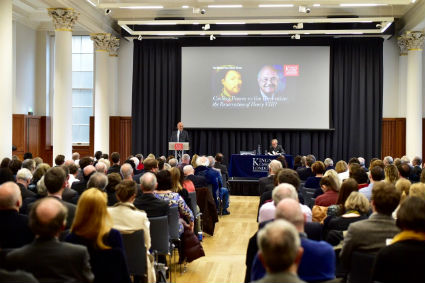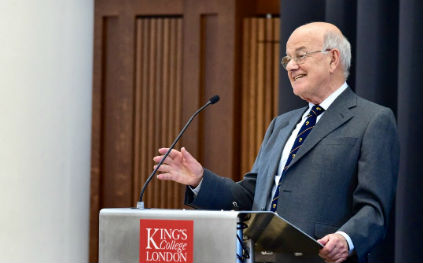Ceding Power to the Executive
The proliferation of Henry VIII clauses and the increased use of delegated legislation represents a threat to parliamentary control over the executive warned Lord Judge, former Lord Chief Justice, at a special event last night hosted by The Dickson Poon School of Law, King’s College London.

Parliamentary sovereignty is fast becoming a discussion topic ahead of the forthcoming referendum on the membership of the European Union. Henry VIII clauses take their name from a misunderstanding of the provisions of the Statute of Proclamations 1539. In fact the House of Commons that year stood firm against a proposal that proclamations by the tyrannical King should have the same force in law as a statute: ‘I venture to suggest that the [commons] would have been appalled at the modern legislative habit of bestowing what we call Henry VIII powers on any old Secretary of State and insulted that we dismiss them this way.’

Over the years Henry VIII clauses have come to be regarded as the high water mark of Parliamentary subservience. Provisions which provide ministers with the power to change key primary legislation through delegated legislation are described as Henry VIII clauses. Yet modern Henry VIII clauses go much further than the Statute of Proclamations every permitted.
In support of his thesis Lord Judge explained that of the 170,000 statutory instruments that have been laid before parliament in the last 65 years only 1 in 10,000, (0.01%)have been rejected by either the House of Commons or the House of Lords. None have been rejected in the Common since 1979.
This lecture comes in the wake of the Strathclyde review which was launched after the House of Lords rejected reforms for the Tax Credits system last autumn. Lord Judge argued that there has been a mischaracterisation of the problem as a fight between the Commons and the Lords, when instead, the issue is the balance of power between the executive and Parliament. Lord Judge called for these linked issues to receive the urgent attention of a Joint Committee of both Houses.
Read a text of the lecture (pdf) on the King's website.
See photos from the event in our Flickr album.
Notes to editors
For further media information please contact Claire Gilby, PR Manager (Arts & Sciences), on 020 7848 3092 or email claire.gilby@kcl.ac.uk.
Lord Judge was called to the Bar in 1963. In 1976 he was appointed a Recorder of the Crown Court and appointed Queen’s Counsel three years later in 1979. In 1988 Lord Judge became a High Court Judge, Queen’s Bench Division and was knighted. From 1990 until 1993, and again between 1996 and 1998, he was Chairman of the Criminal Committee of the Judicial Studies Board. Between 1993 and 1996 he was Presiding Judge of the Midland and Oxford Circuit. In 1996 he was appointed Lord Justice of Appeal and sworn in as a Privy Councillor. From 1998 until 2003 Lord Judge was Senior Presiding Judge for England and Wales, and from 2003 to 2005, Deputy Chief Justice. In 2005 he was appointed the first President of the Queen’s Bench Division. On 1 October 2008 Lord Judge was appointed Lord Chief Justice of England and Wales and Head of the Judiciary of England and Wales. Shortly afterwards he was created a life peer. He retired as Lord Chief Justice on 30 September 2013. In 2015 Lord Judge was appointed as Chief Surveillance Commissioner. He has been awarded several honorary degrees and is Distinguished Visitor and Visiting Professor at King’s.
The Dickson Poon School of Law Distinguished Visitors Programme enables distinguished leaders from the business world, academia, the judiciary, government and the third sector to take up a period of residence in the School and thereby contribute to the School’s research and teaching culture.
For more information about King's please visit the 'King's in Brief' webpages